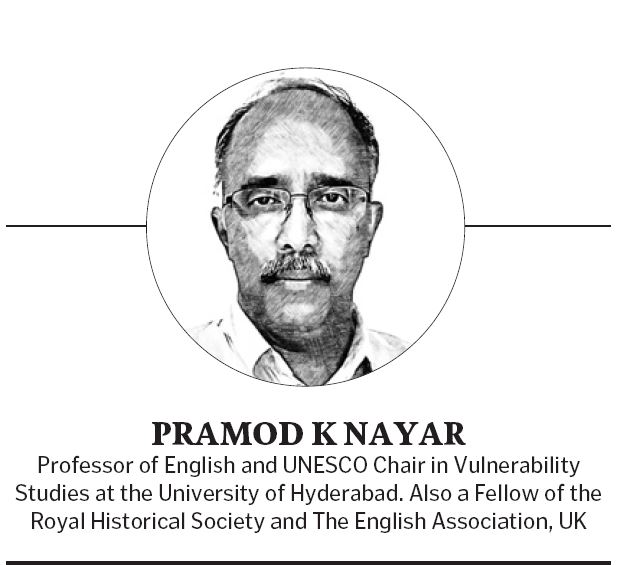What is the point of possessing Freedom of Thought as an ‘absolute right’ if one cannot speak what is on one’s mind?
Published Date – 30 January 2024, 11:59 PM

By PRAMOD K NAYAR
Everyone cites Rabindranath Tagore’s famous lines about the ‘mind is without fear’, which is then ‘led forward …into ever-widening thought and action’ — a condition that he terms the ‘heaven of freedom’. Tagore’s prescient lines have been quoted rightly for their remarkable emphasis — dating from the colonial period — on freedoms. And yet various indices about academic freedom and religious freedom, to name but two, suggest that our mind today is entrammeled in fear, is being led backwards and away from facing up to sordid reality (or worse, brainwashed by propaganda and post-truth reportage), and there is no such thing as a ‘heaven of freedom’ any more.
It is in this context that a report, now just over three years old, and arrived at after consultations with neurologists, philosophers, technologists and policymakers, makes interesting reading. This is the UN Report on Freedom of Thought (2021). This Freedom, incidentally, makes up Article 18 of the International Covenant on Civil and Political Rights (ICCPR).
The 2021 report identifies four features of the Freedom of Thought: not being forced to reveal one’s thoughts; no punishment and/or sanctions for one’s thoughts; no alteration of one’s thoughts without informed consent; and states to foster an enabling environment for freedom of thought (echoes of Tagore’s last lines from the poem here). Torture, surveillance and curbs on education and/or intellectual freedom are seen as a violation of this Freedom.
Three interesting conundrums emerge from this fascinating report (the first of its kind, by the way, on the Freedom of Thought).
Think, but not Speak?
The question begged by the report is: do we have the Freedom of Speech that ought to accompany the Freedom of Thought? That is, what is the point of possessing Freedom of Thought as an ‘absolute right’, as the report claims, if one cannot speak what is on one’s mind? Woke and cancel cultures, constant surveillance of the technologies of ‘speaking’ — by which one means digital communications — punitive action and legislation on curricula, pedagogy, reading materials and writing – contribute to the collapse of this link of Freedom of Thought and Freedom of Speech.
Writers, artists, comedians arrested, incarcerated and even executed for speaking their minds is a commonplace now. The recent instance of the presidents of three American universities being arraigned for permitting speaking and opinion-making on matters relating to Gaza and Israel indicates that the Freedom of Thought does not, or cannot, quite translate into Freedom of Speech because the contexts for the latter are social, collective and therefore shared. Conversely, extraordinary or even slim pressures on Freedom of Speech could over a period of time induce enough fear against thinking certain thoughts (Tagore meets George Orwell here).
Thus, while the Freedom of Speech does come with its own limitations — necessary curbs on hate speech, for example — Freedom of Thought remains absolute. How is this to be sorted?
Treating Thoughts?
The report undertakes some serious moves in the neurological and psychiatric realms. It worries that psychological interventions — of the biomedical not torturing kind — are instantiations of the curbs on and manipulation of the Freedom of Thought. It writes:
psychotherapies, shock treatments, lobotomies and forced medication — some of which the medical community has denounced — reportedly have been used to coercively alter the thoughts of individuals, forcibly reveal thoughts (beyond legitimate therapeutic purposes), punish “inferred” thoughts, or even physically modify brains, in separate or cumulative violations of the freedom…
It adds:
Consuming psychoactive substances could also modify one’s brain chemistry and structures, causing some scholars and advocates to argue that forcibly administrating such substances may violate freedom of thought.
It cites a US court judgement that declared ‘the plaintiff’s forced medication violated the “emerging right of privacy” including the right to protect one’s mental processes from governmental interference’.
The problem, as a recent commentary by Patrick O’Callaghan et al in the International Journal of Human Rights noted, is that the report also recommends ‘for people with certain mental conditions, … submit[ting to] treatment for mental health is necessary for “restoring” one’s freedom of thought (e.g. if one experiences delusions)’. As O’Callaghan et al ask: if ‘free’ thought is based solely on Reason, as is believed, then how can we define delusional thoughts? Are these less free? How exactly are we defining ‘free’ thought then? (Tagore meets Edgar Allan Poe, or Papa Freud, here)
Thought, from the world?
But think for a moment about how digital cultures work to ensure we manifest, clothe and embody our thought. Questions asked of search engines for instance are manifestations of our thought processes, now out there in the world. Even when our thought processes are at best rudimentary, we seek information, answers and explanations from search engines that then, thanks to their predictive functions, proceed to complete the thought for us. This means, our thoughts are being manipulated by structures, processes and ideologies from our external environment since clearly ‘thought’ is not just in the head any more, if it ever was (Tagore meets Zuckerberg/Musk/Pichai/Altman here).
The report worries that AI and other technologies that rely on predictive logic and ‘truth’ detection document sexual preferences and political views, and, therefore, offer up for searches and queries, appropriate answers, but also infer the individual’s thoughts from her/his queries, and biometric and other data. This can then be seen as interfering with the Freedom of Thought. (Facebook’s tweaking of newsfeeds and predictive marketing are cited by the report at this point).
This leads to the third conundrum: how does one prevent the inferential use of our thoughts and behaviour (which indicates more often than not, our thought processes, fears, anxieties and desires) despite our reliance on technologies and prosthetic devices for everyday functioning and privileges (we do not mind being surveilled for air miles when it gets us discounts)? Having surrendered substantial aspects of our autonomy to the machines that then define us, how can one assume that the mind is without an algorithmically induced fear or desire?
Thought is free, says the UN report on my screen as I write this. And tomorrow, undoubtedly, predictive algorithms will send me to more UN documents.
To set me thinking.





